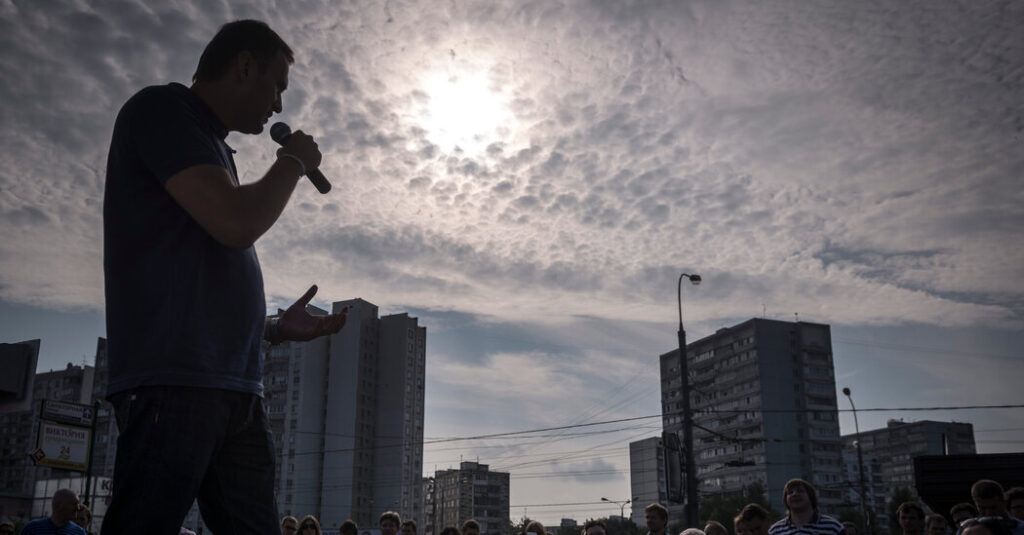[ad_1]
Aleksei A. Navalny, the outspoken activist who Russian authorities said died in prison on Friday, was born on June 4, 1976, according to his website, and grew up outside Moscow to liberal parents who opposed Soviet rule.
Starting his political career as an anticorruption blogger who organized street protests, Mr. Navalny mobilized a generation of young Russians through social media and rose to prominence for investigations into Russia’s elite.
Here’s a look at Mr. Navalny’s career:
2000
Mr. Navalny, who had studied law and finance and worked as a real estate lawyer, joined the liberal Yabloko party the same year that Vladimir V. Putin was first elected president of Russia. Looking to organize grass-roots opposition to the Kremlin, he took aim at what he called lawless Moscow construction projects, moderated political debates, started a radio show and criticized pro-Putin tycoons on a widely read blog.
2011
Mr. Navalny led protests of thousands of Russians who were outraged over reports of fraud in Russia’s parliamentary elections that year, drawing the largest anti-Kremlin demonstrations since Mr. Putin became president.
2013
He ran for mayor of Moscow, capturing 27 percent of the vote.
2017
Mr. Navalny was barred from a presidential run after a Russian court convicted him on fraud charges. He organized nationwide protests and boycotts against Mr. Putin’s re-election and built up offices and investigative teams across the country to investigate Russia’s elite.
The Russian authorities responded by jailing him, accusing him of money laundering and raiding the homes and offices of activists with whom he was affiliated.
August 2020
While flying back to Moscow from Siberia, Mr. Navalny fell violently ill, forcing the plane to make an emergency landing. More than two days after he lost consciousness, Mr. Navalny was flown to Germany for treatment, after the flight was delayed by Russian doctors who blocked his transfer.
Weeks later, the German government said that Mr. Navalny had been poisoned with a military-grade nerve agent called Novichok, a class of chemical weapon developed by the Soviet Union. A similar weapon had been used in 2018 against Sergei V. Skripal, a former Soviet spy, and his daughter in an attack in England that the British government attributed to Russian military intelligence.
December 2020
Bellingcat, an open-source investigative outlet, published a report showing that Russian intelligence officers from the Federal Security Service, or F.S.B., had trailed Mr. Navalny for years and were close by when he was exposed to Novichok. The Kremlin continued to deny any involvement in his poisoning.
Days later, Mr. Navalny posted a video on his YouTube channel that he said showed him calling a Russian intelligence officer and tricking him into confessing to a plot to kill Mr. Navalny by planting poison on his underwear.
January 2021
Five months after he was poisoned, Mr. Navalny flew back to Moscow and was arrested upon arrival. Tens of thousands of protesters, mostly young Russians, took to the streets to demand his release in the biggest public showdown in years between the Kremlin and its critics.
Two months later, the Russian authorities ordered Mr. Navalny to serve a two-year prison sentence in a penal colony known for its abusive treatment of inmates, beginning a string of prison terms for charges that his supporters said were based on fabricated charges. He went on a weekslong hunger strike to protest the prison’s lack of proper medical treatment, causing his health to deteriorate.
January 2022
“Navalny,” a documentary following the activist for months as he investigated his own poisoning, premiered at the Sundance Film Festival. The film, by Canadian director Daniel Roher, received the Academy Award for best documentary feature the following year. Yulia Navalnaya, Mr. Navalny’s wife, said onstage at the ceremony that her husband had been imprisoned for “telling the truth” and “defending democracy.”
August 2023
A Russian court sentenced Mr. Navalny, who was still in prison, to an additional 19 years on charges of supporting “extremism.” The court ruled that the sentence was to be served concurrently with his existing ones, meaning he would probably have been locked up until 2031.
December 2023
Mr. Navalny’s aides lost contact with him for 20 days. Finally, his spokeswoman said he had been found — the authorities had moved him to a Arctic penal colony officially known as IK-3 Polar Wolf, located in one of the most remote towns of Russia and known for its harsh conditions.
Feb. 15
He was last seen publicly on Thursday, when he appeared in via video link in a court hearing, standing in a prison cage and wearing a black robe.
The following day, the Russian authorities reported that he had lost consciousness and died after taking a walk at the prison.
[ad_2]
Source link

